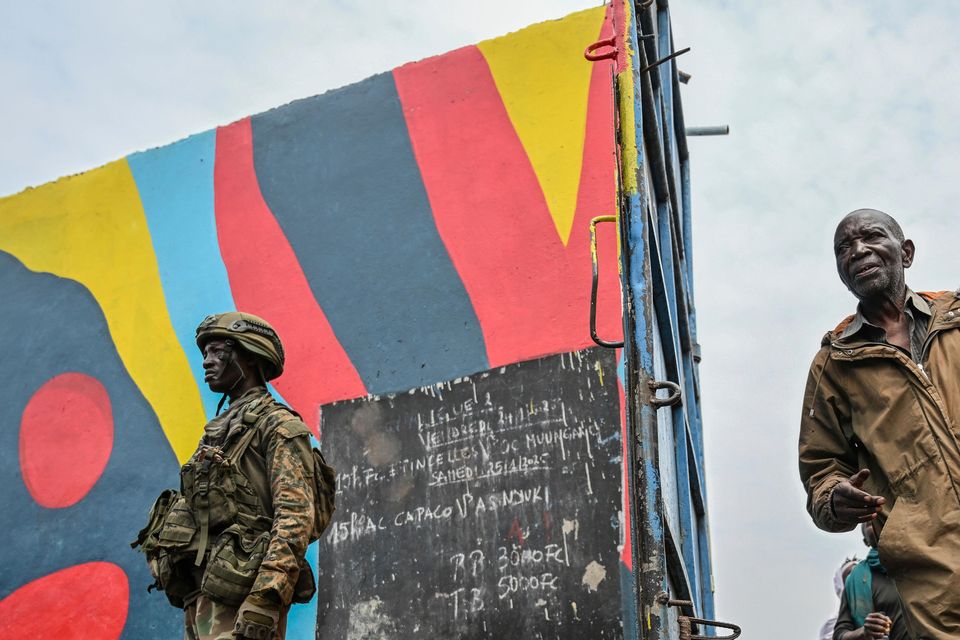At least 773 people were killed in eastern Democratic Republic of Congo’s largest city of Goma and its vicinity this week amid fighting with Rwanda-backed rebels who captured the city in a major escalation of a decadelong conflict, Congolese authorities said on Saturday.
The rebels’ advance into other areas was slowed by a weakened military that recovered some villages from them.
Authorities confirmed 773 bodies and 2,880 injured people in Goma’s morgues and hospitals, Congolese government spokesman Patrick Muyaya told a briefing in the capital, Kinshasa, adding that the death toll could be higher.
“These figures remain provisional because the rebels asked the population to clean the streets of Goma. There should be mass graves and the Rwandans took care to evacuate theirs,” said Mr Muyaya.
Hundreds of Goma residents were returning to the city on Saturday after the rebels promised to restore basic services including water and power supply.
Government soldiers and police officers who surrendered to M23 rebels board trucks to an undisclosed location in Goma earlier in the week (Moses Sawasawa/AP)
They cleaned up the neighbourhoods littered with debris from weapons.
“I’m tired and don’t know which way to go. On every corner (there) is a mourner,” said Jean Marcus, 25, one of whose relatives was among those killed in the fighting.
M23 is the most potent of more than 100 armed groups vying for control in DR Congo’s mineral-rich east, which holds vast deposits critical to much of the world’s technology.
They are backed by around 4,000 troops from neighbouring Rwanda, according to UN experts, far more than in 2012, when they first captured Goma and held it for days in a conflict driven by ethnic grievances.
As the fighting raged on with the M23 rebels on Saturday, the Congolese army recaptured the villages of Sanzi, Muganzo and Mukwidja in South Kivu’s Kalehe territory, which had fallen to the rebels earlier this week, according to two civil society officials who spoke to The Associated Press on the condition of anonymity over fears for their safety.
The central African nation’s military has been weakened after it lost hundreds of troops and foreign mercenaries surrendered to the rebels after the fall of Goma.
UN peacekeeping chief Jean-Pierre Lacroix, meanwhile, said on Friday that the M23 and Rwandan forces were about 60 kilometres (37 miles) north of South Kivu’s provincial capital of Bukavu, covering almost the same distance in the previous two days since they started advancing along Lake Kivu on the border with Rwanda.
Mr Lacroix said the rebels “seem to be moving quite fast” and capturing an airport a few kilometres away “would be another really significant step”.
The seizure of Goma resulted in a dire humanitarian crisis, the UN and aid groups have said. Goma serves as a humanitarian hub critical for many of the six million people displaced by the conflict in eastern Congo.
The rebels said they will march all the way to Congo’s capital Kinshasa, 1,600 kilometres (1,000 miles) to the west.
UN spokesman Stephane Dujarric also told a briefing on Friday that the World Health Organisation and its partners conducted an assessment with Congo’s government between January 26 to 30, and reported that 700 people have been killed and 2,800 injured in Goma and the vicinity. Mr Dujarric confirmed to the Associated Press that the deaths occurred during those days.
The rebel advance has left in its wake extrajudicial killings and forced conscription of civilians, UN human rights office spokesman Jeremy Laurence said on Friday.
“We have also documented summary executions of at least 12 people by M23” from January 26 to 28, Laurence said, adding that the group has also occupied schools and hospitals in the province and are subjecting civilians to forced conscription and forced labour.
Congolese forces have also been accused of sexual violence as fighting rages on in the region, Mr Laurence said, adding the UN is verifying reports that Congolese troops raped 52 women in South Kivu.
Goma’s capture has brought humanitarian operations to “a standstill, cutting off a vital lifeline for aid delivery across eastern (Congo),” said Rose Tchwenko, country director for the Mercy Corps aid group in Congo.
“The escalation of violence toward Bukavu raises fears of even greater displacement, while the breakdown of humanitarian access is leaving entire communities stranded without support,” she said.
